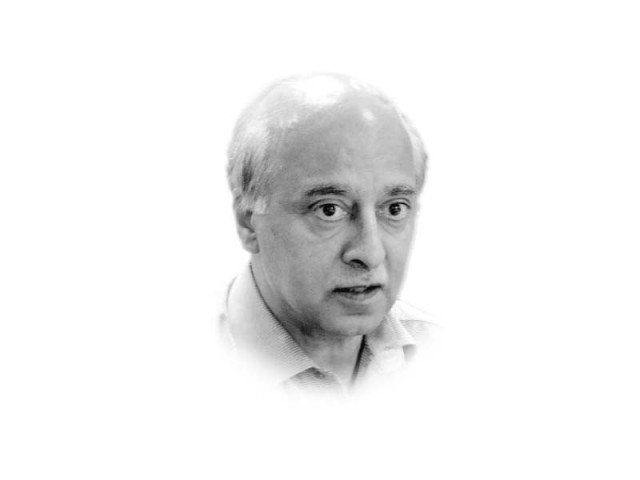It was in the making
Regardless of what Imran attributes the fall of his govt to, he cannot, should not, escape part blame for his exit

Imran Khan failed to read the big writing on the wall; the entire status quo — all stake-holders — had closed ranks to show him the door. Until his last moments as Prime Minister he clung on to misplaced hopes based on tactically impractical advice from God knows where — particularly after losing allies and own members in the National Assembly.
Even the very thought of sacking the army chief (as reported in a section of the media) was childish and reflected poor judgement and a state of denial. Four reasons stand out against the strategy of hanging on to power.
Khan was under the Vote of No Confidence (VONC) whereby he even morally was not supposed to take any key decision such as removal of the army chief.
The special session was on for taking the VNC to the logical end and hence lacked the legal, constitutional and moral authority to take any critical decision.
The Supreme Court, through its April 7 judgement, had left no doubt about its position on the situation arising out of PTI government’s conduct on VONC in and outside the parliament
Khan’s strategy betrayed sheer ignorance of how the GHQ works; the institution will never ditch its serving chief regardless of what outsiders think of him. Remember the GHQ moving in favour of the air-borne Gen Pervez Musharraf on October 12, 1999!
The defence ministry is in fact a mere docile sub-set or benign extension of the military establishment, and hence would have been almost impossible to extract a notification on the COAS dismissal.
Even based on his own claim of a plot against his government, he should have known that he was up against insurmountable odds. What then made him stick out his neck until the decisive meeting late Saturday? Was it the ultimate pressures that forced him to let Speaker Asad Qaisar and his deputy resign their posts?
Now, regardless of what Imran Khan attributes the fall of his government to, he cannot, and should not, escape part of the blame for his exit after 3 years and 7 months. Arrogance, inflexible attitude, endless rant on corruption and accountability and ostracisation of the entire opposition are some of the telling factors that ate into his government, albeit with the help of several Trojan horses he had surrounded himself with — Azam Khan, Nadeem Babar (also very good friends with Omar Ayub), Zulfi Bukhari (reportedly business partner of Ghulam Sarwar Khan), Dr Ishrat Hussein (a man of all seasons) Brig Ejaz Shah ( a close buddy of Gen Musharraf) inter alia.
Worse, Khan embraced as spokespersons people with low intellect and little civic manner; Dr Firdos Ashiq Awan, Fayyazul Hassan Chauhan, Amir Liaqat Hussain — aided by Sheikh Rahseed’s invective-loaded conversations.
Jehangir Tareen, Aleem Khan, Dr Saifullah Niazi and many others were not so obvious until they realised that their extractive business approach had no way with Khan and they eventually decided to side with those addicted to the architecture of extraction and patronage; forces of the deeply entrenched civil-military status quo that has ruled Pakistan for over seven decades of its chequered existence.
In short, Khan gathered lots of people around him who had found in him a gullible man — who had a misplaced megalomaniac vision of reform that he though could bring about with the help of these people.
People around him preyed on the vulnerabilities of Khan, whispering into his ears what he loves — tabdeeli, bravado, curse on political rivals, and refrain from talking to them. With his endless rant on anti-corruption, Khan became totally blind to the fact that as Leader of the House in a parliamentary system, engagement with the Leader of the Opposition was unavoidable.
He took undue credit for all the cases that NAB instituted against several PML-N and PPP politicians. The entire anti-graft campaign turned out to be a damp squib in a system wherein lower judiciary and bar members — both defence and prosecutors who tend to dance to the interests and advice of their clients than to the fundamentals of the rule of law.
Many questions indeed! Coming weeks and months will certainly provide some of the answers to these questions, including of course on the meanwhile infamous ‘Washington Cable’ that Khan had waved at the March 27 Parade Ground rally. It will haunt Pakistan until perhaps a multi-head judicial commission gets to the bottom of the issue. A closure of this issue at state level is paramount to re-instill confidence in the ministry of foreign affairs.
Before lunging into an aggressive election campaign, former prime minister will do good to himself to step back for a while and introspect as to where he went wrong and whether he appointed and listened to the right people. A litany of missteps, reckless rhetoric, deployment of religious sentiment, and impulsive management of relations with key stakeholders are some of the issues that require deep reflection not reiteration.
Published in The Express Tribune, April 14th, 2022.
Like Opinion & Editorial on Facebook, follow @ETOpEd on Twitter to receive all updates on all our daily pieces.















COMMENTS
Comments are moderated and generally will be posted if they are on-topic and not abusive.
For more information, please see our Comments FAQ